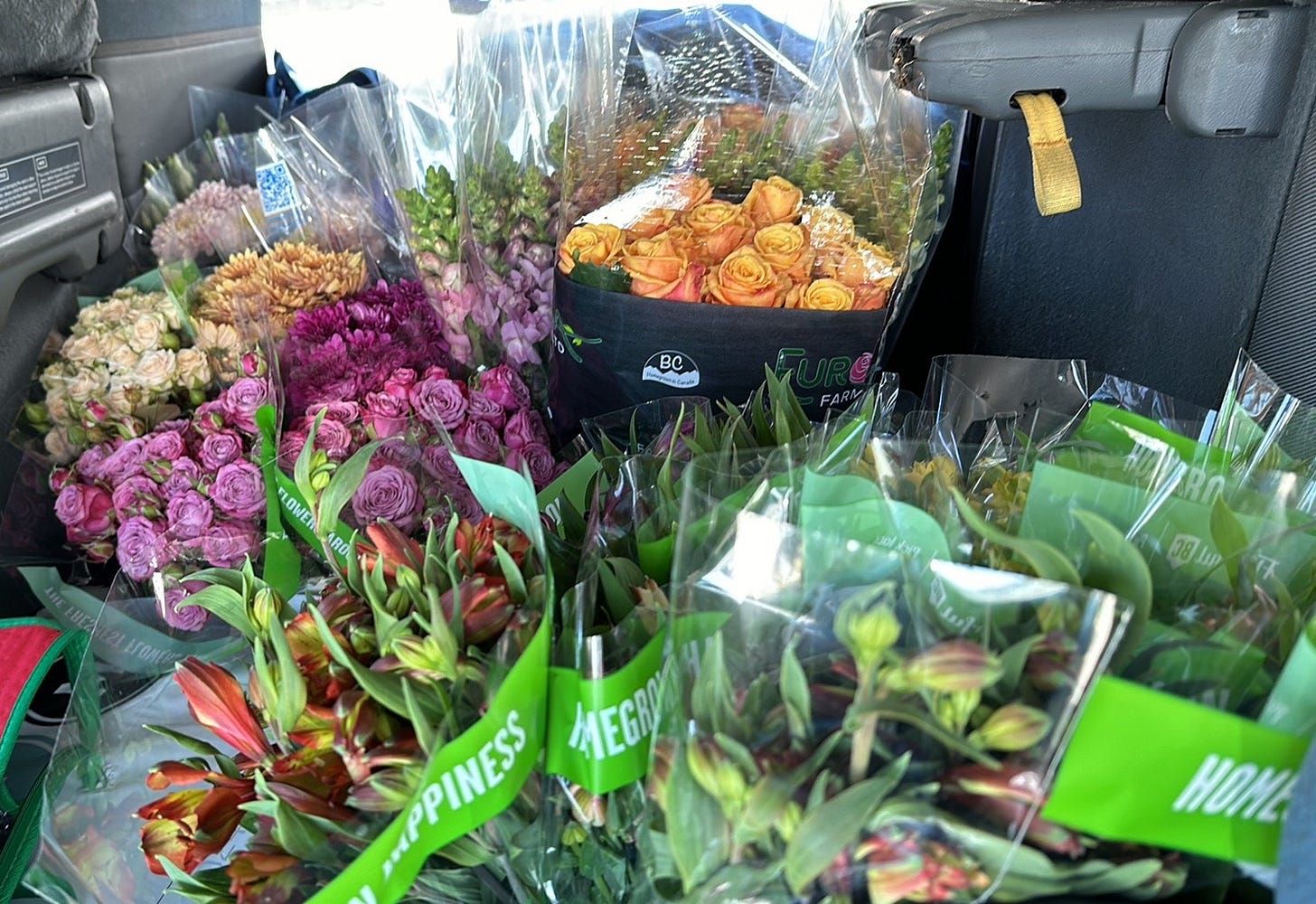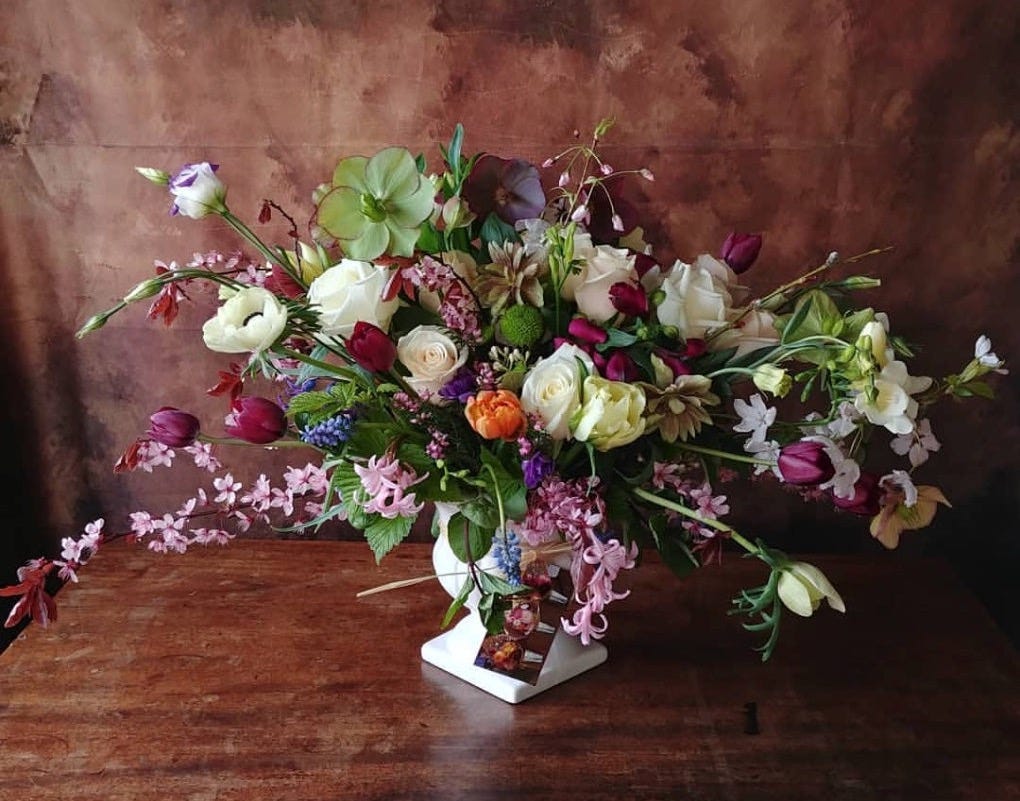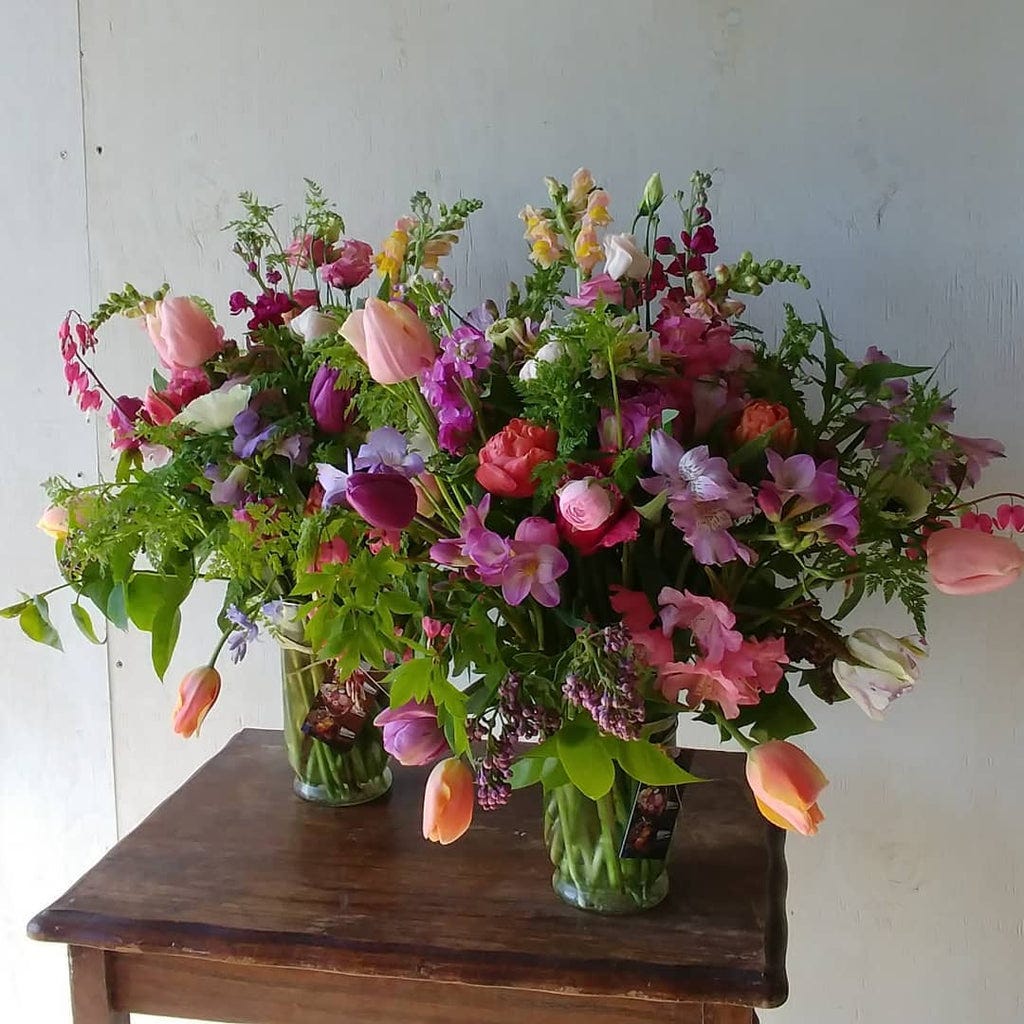What Are Local Flowers, and Why Should You Care?
At Alchemy Farm, ‘local’ means flowers mean our own farm grown flowers, or those grown within 100 miles of our farm—flowers raised with care and sustainability.
The car is filled with a vibrant but foreign energy. I’ve just picked up locally grown flowers from a greenhouse grower and wholesaler, a short ferry ride from my home and farm on Salt Spring Island.
It’s January and the car is filled with a vibrant, living energy. The backseat is brimming with locally grown flowers I’ve just picked up from a greenhouse grower—a short ferry ride from my home on Salt Spring Island. Driving home on a winter day makes their colors seem brighter, their scent fresher, reminding me of what we had to look foward to when spring arrived in our gardens.
What We Do at Alchemy Farm
Since 2016, I’ve been growing and designing with my own flowers at Alchemy Farm. I truly love my flowers. I spend hours planning and choosing flower varieties that I then raise from seed or seedling.
They become beautiful flower messengers that carry special wishes for people’s loved ones, for their special life events and celebrations, and they provide a tangible comfort for those who have lost a loved one. We are honoured to be doing this work.
At the end of October, the close of our growing season, I felt sad to be waiting until spring to welcome my flower friends once again. I hadn’t planned on extending my design season with someone else’s flowers, but I had so many requests from customers, I hesitated—using someone else’s flowers felt foreign to me. But I decided to explore what local growers could offer, and it opened my eyes to the beauty of working with local flowers grown close to home.
The Canadian Flower Business
Flowers are big business. In 2016, Canada imported $483 million worth of flowers. In comparison, the United States imported a staggering $2.16 billion. The majority of these flowers were grown thousands of miles away, often in countries where pesticide regulations are lax and environmental and labor practices are questionable. Canadian flower growers cannot compete on price with cheap flowers grown in third world countries. But, price isn’t everything.
Most people have no idea that almost all flowers sold by florists and supermarkets are grown tens of thousands of miles away and many times in third world countries. The next time you admire exotic flowers in the store – and often they are not that exotic – try to imagine the journey that flower has taken to get to you.
Perhaps it has travelled from Israel, South Africa, New Zealand or a South American country. You don’t actually know where these flowers are from or what their story is and, even more importantly, how they were grown.
KNOW WHERE YOUR FLOWERS ARE GROWN
Flowers are not consumed so they are not subject to the same stringent testing or regulations as food. Many flowers are grown in countries where pesticide restrictions do not exist, which means that the flowers they produce are filled with toxic pesticides and fungicides (such as DDT, dieldrin, methyl parathion and more), many banned in Canada and the United States.
Some flowers are grown using child labour, or by people working under terrible conditions with serious health risks, or by growers who use unsustainable and environmentally unfriendly practices. Not only are imported flowers grown with toxic chemicals, they are heavily sprayed with pesticides before they are shipped.
The flowers in your bouquet may have traveled farther than most of us do in a year. In fact, the global flower industry is staggering in scale—and often in its impact on the environment and human health.
CONSEQUENCES OF BUYING EXOTIC FLOWERS
Has anyone told you they are allergic to flowers? Perhaps they have said that they feel unwell or get headaches when they are around them? They might not be allergic at all; they might be reacting to the chemical residue on the flowers. The heaviest users of agricultural chemicals are conventional flower growers who use pesticides that are some of the most toxic.
In 2016, the International Journal of Environmental Research and Public Health published a study of pesticide residues on flowers from Belgium florists. The study found that the cut flowers were loaded with substances that present acute toxicity, with direct exposure affecting the nervous system of florists.
Many pesticides applied to flowers are persistent, rub off on hands with contact, and are easily absorbed through the skin. Flower workers and floral professionals worldwide have been reported health problems that include contact dermatitis, neurological problems, cancers, hematotoxic effects, endocrine disruptors and more.
What We Are Doing at Alchemy Farm and What You Can Do
With conventional flowers found in florist shops and supermarkets being grown thousands of miles away from where they are sold, I decided that flowers grown within 100 miles of our farm would classify as local.
Honestly, though, I’m thinking of getting a heated greenhouse so that I can continue growing and working with my own flowers –flowers that are grown organically with absolutely no chemicals, pesticides or preservatives.
The flowers that are delivered to my customers couldn’t be fresher because they’re picked from my own gardens just steps away from my door. We grow hundreds of varieties of flowers and greens. Our flowers are specially chosen and handpicked to order 24 to 48 hours before they are delivered.
The Locally Grown and Slow Flower movements, which are gaining momentum in North America, are being led by flower farmers growing local flowers with organic and sustainable practices.
When you buy flowers from a local flower farmer, not only can you meet the farmer and learn about your cut flowers’ journey from seed to vase, but you also contribute to the local economy and support local jobs where workers are paid fair wages.
Deciding to grow my own flowers, or using local flowers grown within 100 miles of Alchemy Farm, was a deeply philosophical and personal decision - it’s how I’m becoming part of the change I want to see happening in the world. It’s how I’m walking my talk as an environmental artist.
I invite you to join me in creating real change in the world. It may seem like a small thing, but buying local flowers supports local farmers, and helps to create a more sustainable and healthy world for all beings. Every little bit counts.
The next time you buy flowers, ask your florist where they came from. Seek out local growers, explore farmer’s markets, or even consider planting a small garden of your own. Together, we can create a movement that nurtures the earth, supports local farmers, and honors the beauty of nature.
A version of this article originally appeared on the Alchemy Farm blog, updated here for Substack readers.






